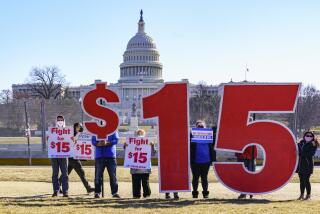Congress Passes $4.55 Wage Floor Bill in Face of Veto
WASHINGTON — The Senate gave final approval Wednesday to a bill raising the federal minimum wage to $4.55 an hour--setting the stage for a certain veto by President Bush and a major confrontation with the White House over how far Democrats can push on social issues.
Bush reiterated Wednesday that he will veto the legislation, arguing in a speech before a retailers’ conference that it would force employers to cut back on the number of new entry-level jobs they create and that it would ultimately exacerbate inflation.
“If the majority in the Congress rejects my offer of a reasonable compromise,” he said, “a veto is going to be inevitable.”
Bush has proposed an increase to no more than $4.25 an hour, to take effect in 1992 rather than in 1991, as the bill passed Wednesday provides.
The President reasserted Wednesday that he would not accept any increase that exceeds his own proposal--a point underscored by White House Chief of Staff John H. Sununu. He had told the same group earlier that “$4.25 is fine” but “$4.26 is vetoland--now and forever.”
Democratic strategists conceded that Bush appeared to have the upper hand in the standoff. The 63-37 vote in the Senate fell short of the two-thirds majority that Democrats would need to override a veto. The measure was passed May 11 by the House on a 247-172 vote, also short of a two-thirds majority.
It was not clear whether Democrats would seek to scale back the size of the increase after Bush vetoes the new legislation or simply allow the measure to languish and use the veto as a political issue to paint the Administration as uncaring about the poor.
The Democrats already have compromised somewhat by agreeing to create a new subminimum wage that would enable employers to pay new workers with fewer than 60 days’ experience 85% of the minimum in an effort to stave off any job cuts from the increase in labor costs.
Sen. Edward M. Kennedy (D-Mass.), who led the Democratic effort on the Senate floor, challenged as “a sham” Bush’s assertions that he had attempted to compromise with Congress. “ ‘Let them eat cake’ is the message (to the poor) from the White House,” Kennedy said.
Bush’s hard-line stance is only partly on economic grounds. White House strategists said the President must draw the line now on the minimum wage issue or Democrats will be emboldened to challenge him with more-expensive proposals on other social issues, such as child care.
Most analysts contend that, with unemployment now so low--and labor scarce--the measure would have little real economic impact. Only a few million workers of the 99 million now in the work force actually earn the federal minimum wage, which is $3.35 an hour.
Moreover, in the eight years since the last increase in the federal minimum wage, many states--including California--have enacted state minimums that are higher than the federal minimum. California’s minimum wage, for example, is $4.25 an hour.
Nevertheless, a veto by Bush later this month would put the Democrats in something of a quandary. Mainstream Democrats, led by Kennedy and Rep. Augustus F. Hawkins (D-Los Angeles), have made the minimum wage issue a major agenda item this year.
Bush’s hard-line position on the issue stands in sharp contrast to the more conciliatory approach he has taken in other areas, such as foreign affairs and reduction of the budget deficit, where he has sought to hammer out bipartisan accords.
It also marks a major break with the Ronald Reagan Administration, which had consistently opposed any increase in the minimum wage. Bush announced the shift during the 1988 presidential campaign but tempered it with a demand that Congress enact a subminimum training wage.
In his speech to the retailers’ group Wednesday, the President sought to portray the Democratic-sponsored legislation as likely to hurt low-income workers by depriving them of jobs. He disagreed with Democratic assertions that the difference between his stance and theirs is “three thin dimes.”
“My difference with the majority in Congress is not about 30 cents an hour on the minimum wage legislation; it’s about hundreds of thousands of people . . . who won’t have a job to go to if the minimum wage legislation before the Congress now becomes law,” Bush told the group.
“I can sign the legislation pending in Congress and go back to the tired agenda of government intervention that so often hurts the very people it attempts to help, or we can step forward to keep America on the path to a competitive future,” he said.
More to Read
Get the L.A. Times Politics newsletter
Deeply reported insights into legislation, politics and policy from Sacramento, Washington and beyond. In your inbox three times per week.
You may occasionally receive promotional content from the Los Angeles Times.










